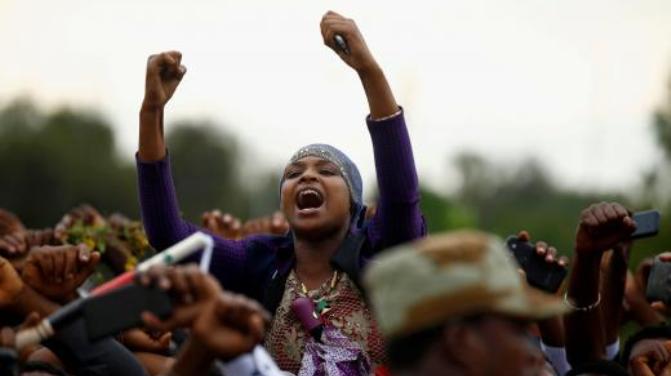Ethiopian opposition parties to face justice over bloody unrest

By Tesfa-Alem Tekle
April 20, 2017 (ADDIS ABABA) – Ethiopia House of Peoples Representatives on Thursday decided to refer three opposition political organisations to the justice for their alleged role in the recent bloody protests in several parts of the country.
The parliamentary decision was passed following a report by the state-affiliated Ethiopian Human Rights commission (EHRC) on the human rights violations committed during a series of protests in November 2015 and led to the country’s current state of emergency.
The report recommended to investigate the violence in Oromia, Amhara and Southern Nations Nationalities and Peoples (SNNP) region.
The Ethiopian lawmakers have decided that the main Oromo peoples party, Oromo Federalist Congress party (OFC) and Blue party have to face charges for playing a role in the violence which first erupted in Oromia region and quickly spread to other parts of the country.
The government-affiliated rights body said the two legally operating political parties, OFC and Blue party will be charged for their roles in instigating and fuelling the deadly protests in Oromia and Amhara region respectively.
The House has also decided for charges to be pressed against a third political organisation, Gedio Peoples Democratic Organization, for having roles in Ethnic-based attacks carried out in SNNP regional state.
The EHRC in its report partly commended the security forces for showing restraint in some violent protest incidents However it firmly recommended prosecution against security agents who had used excessive force.
The parliament has also backed EHRC’s recommendations for some government officials and security organs who had roles in the violence to face charges.
Since 2015, the horn of Africa’s nation has been engulfed in a wave of anti-government protests in Oromia and Amhara region over complaints of political, economic and territorial marginalisation.
International human right groups said hundreds of protesters have been killed by the government forces and called for an international investigation. Also, the European Union and the United Nations called for an independent investigation
Ethiopian Prime Minister, Hailemariam Desalegn, rejected the call saying his country doesn’t need any external interference hence it is able to conduct the investigation on its own.
In its report, the Ethiopian rights commission officially disclosed that 669 people including 63 policemen have died during the violence.
On March 30, Ethiopian parliament unanimously decided to extend the state of emergency imposed in October last year for additional four months in what Addis Ababa says is to ensure absolute calm and stability across the country.
(ST)
